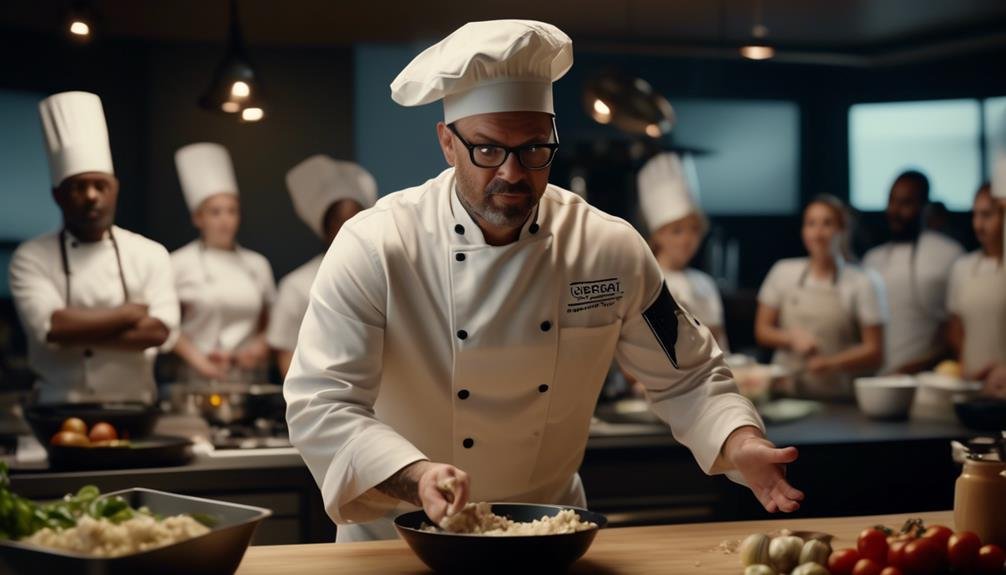Online Culinary Courses for Aspiring Chefs and Food Enthusiasts
As an aspiring chef or food enthusiast, you may find yourself torn between the traditional path of culinary school and the convenience of online learning.
The decision of whether to pursue your culinary education online or in a physical setting is a crucial one, and it's essential to weigh the benefits and considerations of each option.
Online culinary courses offer a flexible and accessible way to learn the art of cooking, but there are important factors to consider before diving in.
Whether you're looking to expand your culinary skills for personal enrichment or to launch a professional culinary career, the world of online culinary education holds a myriad of possibilities.
Key Takeaways
- Online culinary courses offer flexible and accessible learning, allowing students to learn at their own pace and access course materials and tutorials anytime.
- These courses provide networking opportunities with instructors and fellow students, allowing individuals to build a strong professional network within the culinary industry.
- Online culinary courses offer hands-on experience through virtual labs and interactive assignments, allowing students to develop essential skills such as knife skills, flavor pairing, and creativity in enhancing dishes.
- Culinary specializations offered in online courses, such as pastry and baking, culinary nutrition, food styling, culinary entrepreneurship, and niche development, allow individuals to explore their interests and carve out a unique niche in the food industry.
Benefits of Online Culinary Courses
Discover the convenience and flexibility of honing your culinary skills through online courses, allowing you to learn at your own pace from the comfort of your home. Online culinary courses offer unparalleled flexibility, enabling you to manage your time effectively and fit your passion for cooking into your busy schedule. You can access course materials and tutorials at any time, making it easier to balance learning with work, family, or other commitments. Additionally, these courses provide networking opportunities with instructors and fellow students from around the world, allowing you to build valuable connections within the culinary industry.
Despite being online, these courses offer hands-on experience through virtual labs, interactive assignments, and live demonstrations. You can practice essential techniques in your own kitchen, receiving real-time feedback from instructors to improve your skills. The flexibility of online culinary courses not only allows you to customize your learning experience but also provides the convenience of accessing resources and support whenever you need them.
With the ability to manage your time effectively, connect with professionals in the industry, and gain practical experience, online culinary courses offer a comprehensive and engaging approach to honing your culinary skills.
Choosing the Right Culinary Program
When considering which culinary program is right for you, it's important to weigh the different types of programs available, their accreditation status, and their industry connections.
These points will help you make an informed decision that aligns with your career goals and aspirations as a chef.
Program Types
When considering the right culinary program for your aspirations, it's essential to explore the various types available to ensure it aligns with your career goals and learning preferences.
Here are three program types to consider:
- Culinary Techniques and Practical Experience: Some programs focus on honing specific culinary techniques and providing practical experience in a professional kitchen setting. These programs are ideal for those who learn best by doing and want hands-on training.
- Culinary Theory and Hands-On Training: Other programs emphasize a strong foundation in culinary theory combined with hands-on training. These are great for individuals who want to understand the principles behind cooking while also gaining practical skills.
- Specialized Culinary Programs: There are also specialized programs that cater to specific cuisines, dietary preferences, or culinary niches, allowing you to focus on a particular area of interest.
Accreditation Status
Considering the accreditation status of culinary programs is essential to ensure that you are choosing a reputable and recognized institution for your culinary education. When evaluating online culinary courses, it's important to understand the accreditation process and how it impacts the quality of the program. Accreditation ensures that a culinary school meets specific standards of quality, which can affect the value of the education you receive. To help you make an informed decision, here's a comparison of accreditation status for online culinary programs:
| Culinary Program | Accreditation Status |
|---|---|
| Culinary Institute of America | Accredited by the Middle States Commission on Higher Education |
| Le Cordon Bleu | Accredited by the Accrediting Commission of Career Schools and Colleges |
| Escoffier Online International Culinary Academy | Accredited by the Distance Education Accrediting Commission |
Understanding the accreditation status of the culinary programs you are considering is crucial to ensuring the quality and recognition of your education.
Industry Connections
To choose the right culinary program, it's crucial to assess the industry connections offered by each institution, as these connections can significantly impact your career opportunities and professional network. When evaluating culinary programs, consider the following:
- Industry Partnerships: Look for programs that have strong ties to restaurants, hotels, and food establishments. These partnerships can provide valuable hands-on experience, internships, and potential job opportunities upon graduation.
- Job Placement Opportunities: Investigate the program's track record for placing graduates in relevant positions within the culinary industry. A strong job placement rate indicates that the program is well-regarded by employers and can effectively prepare you for a successful career.
- Networking Events: Seek programs that offer networking events, career fairs, and alumni connections to help you build a strong professional network within the culinary world. These connections can open doors to exciting career opportunities.
Essential Skills Taught in Online Courses
Online culinary courses teach you essential skills like mastering knife techniques, discovering flavor pairings, and perfecting plating methods.
These courses provide interactive lessons and demonstrations to help you hone these skills from the comfort of your own kitchen.
Knife Skills
Mastering knife skills is a fundamental aspect of culinary training, allowing aspiring chefs to efficiently and precisely prepare ingredients for a wide range of dishes. In online culinary courses, you'll learn essential knife skills through detailed demonstrations and hands-on practice.
Here's what you can expect to learn:
- Knife maintenance and cutting techniques: You'll discover the importance of keeping your knives sharp and well-maintained, as well as various cutting techniques such as chopping, dicing, and julienning.
- Knife safety and precision cutting: Understanding proper hand placement and body posture to ensure safety while mastering precise cutting techniques will be emphasized.
- Knife selection and handling: You'll be guided on choosing the right knife for specific tasks and how to confidently handle different types of knives for various culinary purposes.
Flavor Pairing
When exploring the essential skills taught in online culinary courses, one can't overlook the art of flavor pairing, a technique that elevates the taste and depth of your culinary creations.
Understanding flavor profiles and how different ingredients complement each other is crucial in creating harmonious dishes. Online courses teach you to develop your palate through tasting techniques, enabling you to discern and balance flavors effectively.
You'll learn to combine ingredients based on their unique tastes, textures, and aromas, enhancing your dishes with creativity and finesse. Whether it's mastering classic pairings or experimenting with unconventional combinations, these courses empower you to confidently create dishes that tantalize the taste buds.
Embracing the art of flavor pairing not only enhances your cooking skills but also allows you to craft memorable dining experiences for yourself and others.
Plating Techniques
Enhance the visual appeal and overall dining experience of your culinary creations by mastering the art of plating techniques, a fundamental skill taught in online culinary courses. Presentation skills are crucial for making your dishes stand out.
Here are some essential plating tips to elevate your dishes:
- Balance and Contrast: Create visual interest by balancing colors, textures, and shapes on the plate. Contrasting colors and textures can make the dish more visually appealing.
- Negative Space: Utilize negative space on the plate to highlight the main elements of the dish. This technique can make the presentation look more sophisticated and less cluttered.
- Garnishing: Learn how to use garnishes strategically to add a pop of color, freshness, and flavor to your dish. Garnishes should complement the flavors and overall presentation of the dish.
Exploring Culinary Specializations
Embarking on a culinary journey involves exploring various specializations to develop expertise in specific areas of the culinary arts. As an aspiring chef or food enthusiast, it's essential to stay updated with the latest food trends and consider the possibility of culinary entrepreneurship. By delving into specialized culinary areas, you can carve out a unique niche for yourself in the food industry. Here are some exciting culinary specializations to consider:
| Specialization | Description | Skill Emphasis |
|---|---|---|
| Pastry and Baking | Explore the art of creating delectable pastries, bread, and desserts. | Baking Techniques, Flavor Pairing, Decorating |
| Culinary Nutrition | Focus on the intersection of food and health, learning to create nutritious and delicious meals. | Nutritional Analysis, Menu Planning, Dietary Restrictions |
| Food Styling | Master the art of visually presenting food for photography, events, or media. | Plating Techniques, Photography, Color Theory |
These specializations not only allow you to deepen your culinary expertise but also open up opportunities to explore food trends and potentially start your own culinary ventures. Whether you're drawn to the precision of pastry, the science of culinary nutrition, or the creativity of food styling, each specialization offers a unique and rewarding path in the culinary world.
Online Course Formats and Structures
As an aspiring chef or food enthusiast, you can further your culinary expertise through online courses that offer diverse formats and structures to accommodate different learning styles and schedules. Online culinary courses are designed to engage students through interactive learning experiences, providing a rich and immersive education that mirrors the traditional classroom setting.
Here are some common online course formats and structures:
- Self-Paced Courses: These allow you to complete the course at your own speed, offering flexibility for those with busy schedules. You can access pre-recorded lectures, assignments, and resources at your convenience.
- Live Virtual Classes: These provide real-time interaction with instructors and fellow students, fostering student engagement through discussions, demonstrations, and feedback sessions.
- Hybrid Programs: These blend online coursework with in-person experiences such as workshops, externships, or culinary events, offering a well-rounded and interactive learning approach.
The online culinary education landscape is evolving to meet the diverse needs of students, providing a range of formats and structures that prioritize student engagement and interactive learning.
Tips for Success in Online Culinary Learning
Discover essential strategies for excelling in online culinary learning to elevate your skills and knowledge in the culinary arts.
Time management is crucial when taking online culinary courses. Set aside specific times for studying, and treat them as seriously as you'd a traditional class. Create a study schedule that allows for regular breaks to keep your mind fresh and focused.
Effective studying is key to success. Find a quiet, comfortable space to study where you can concentrate without distractions. Take thorough notes during lectures and demonstrations, and review them regularly to reinforce your learning.
Use online resources, such as instructional videos and interactive tools, to supplement your studies and gain a deeper understanding of the material. Participate actively in online discussions and forums to exchange ideas with fellow learners and instructors, broadening your perspective and deepening your understanding of culinary concepts.
Advancing Your Culinary Career With Online Courses
To continue on your path in the culinary world, consider the valuable opportunity of advancing your career with online courses that can enhance your skills and open new doors for professional growth. Taking online culinary courses offers numerous benefits beyond just learning. Here are some ways online courses can help advance your culinary career:
- Time Management:
Online courses allow you to manage your learning schedule according to your availability. This flexibility enables you to balance your current work or personal commitments while advancing your culinary skills.
- Virtual Networking:
Engaging in online courses provides opportunities to connect with chefs, industry professionals, and fellow learners from around the world. This virtual networking can lead to collaborations, job opportunities, and mentorship, enhancing your career prospects.
- Culinary Creativity and Global Cuisine:
Online courses often cover a wide range of culinary topics, including global cuisines and innovative cooking techniques. This exposure can inspire and enhance your culinary creativity, allowing you to explore diverse culinary traditions and stay ahead in the ever-evolving culinary landscape.
Conclusion
So, now you're all set to embark on your online culinary journey! With the right program and dedication, you'll be slicing, dicing, and sautéing like a pro in no time.
Remember, it's not just about the cooking – it's about the art, the science, and the passion behind it all. So, grab your apron, sharpen those knives, and get ready to whip up some delicious dishes that will have everyone begging for seconds!
Happy cooking!







